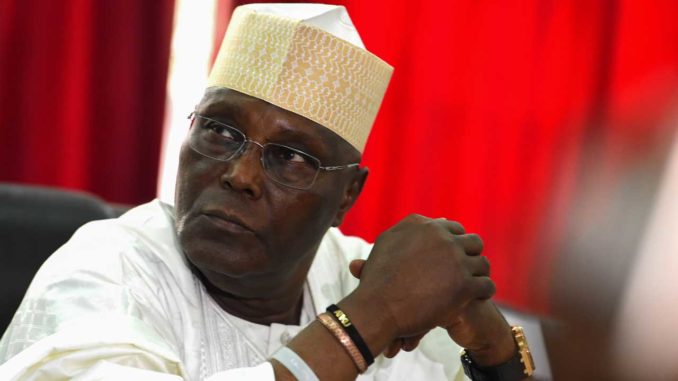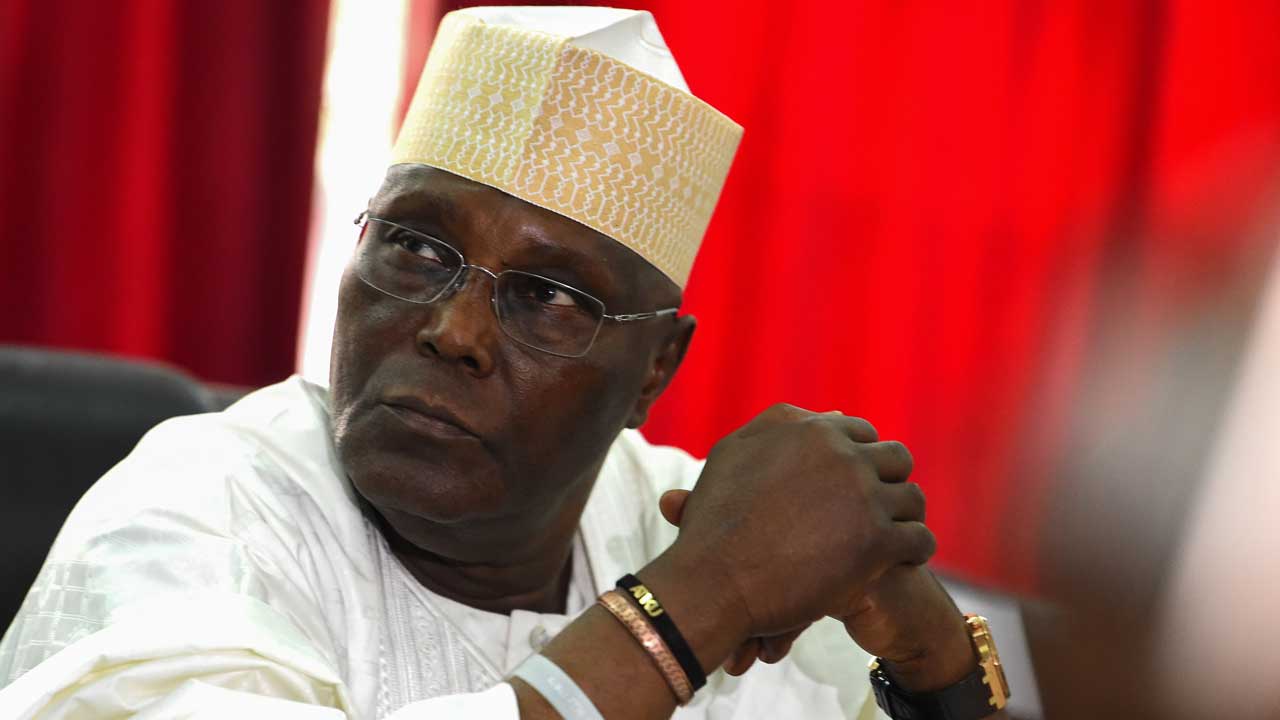

The candidate of the Peoples Democratic Party (PDP) in the last presidential election, Atiku Abubakar, has asked the Supreme exclusively reported on Sunday Court to declare him winner of the February 23 presidential election.
This is coming as the All Progressives Congress (APC) has filed motions challenging sections of the September 11 presidential election tribunal judgment, and seeking the nullification of evidence proffered by the PDP and accepted by the tribunal.
Atiku’s request was contained in a joint appeal with his party, PDP, against the judgment of the Presidential Election Petition Tribunal (PEPT), which dismissed their petition for being incompetent and lacking in merit.
A copy of the appeal, which was filed on Monday as exclusively reported on Sunday by THSDAY, was obtained yesterday.
The five-man panel in the lead judgment delivered by its Chairman, Justice Mohammed Garba, held that the petitioners failed to prove their allegations against President Muhammadu Buhari, whose declaration as winner of the election they are challenging, and the conduct of the election.
But Atiku and PDP in a 95-page document containing 66 grounds of appeal, urged the Supreme Court to set aside all the decisions of the tribunal because it erred in reaching the conclusion that the petitioners failed to prove their case against the respondents.
The petitioners had hinged their case on the grounds that Buhari lied on oath in his Form CF001 submitted to INEC to aid his clearance for the presidential election.
They have also alleged irregularities and substantial non-compliance with the Electoral Act and guidelines during the poll.
Respondents in the petition include the Independent National Electoral Commission (INEC), Buhari and the All Progressives Congress (APC).
In the appeal filed against the upholding of Buhari’s election by the tribunal, the petitioners said the panel erred in law by holding that Buhari was eminently qualified to contest the poll. They also accused the panel of descending into the arena to defend Buhari.
They accused the justices of making use of evidence never pleaded or led at the trial by any of the respondents and sometimes credited statements to the petitioners’ witnesses, which were never made.
For example they submitted that, “there was no evidence at the trial that schooling at the Military Training School was “higher than Secondary School Certificate education.”
“The 2nd respondent or any of the respondents for that matter did not lead evidence on the meaning of “Officer Cadet”.
“The 2nd respondent neither claimed nor led evidence that the 2nd respondent was “eminently qualified to contest.”
“Contrary to the testimony of RW1 regarding the submission of his certificates to the Army, the lower court inferred that the 2nd respondent “in fact submitted his certificates to the military.”
The appellants further argued that INEC did not lead evidence wherein it informed the court that it was satisfied with the qualification of the Buhari.
Also Buhari, according to the petitioners, throughout the trial, did not lead any evidence to show that he successfully went through primary school, secondary school and famous military college(s) in the USA, UK and or India, whereas the lower court assumed he did.
In ground one of the appeal, Atiku and PDP said the tribunal erred in law when it relied on “overall interest of justice” to hold that Buhari’s documents were properly admitted in evidence.
According to them, the documents, which bordered around his certificates, were not pleaded and were not front-loaded.
On ground two, relating to the ruling of the tribunal that Buhari does not need to attach his certificates to his Form CF 001, the appellants submitted that the tribunal gave restrictive interpretation to Section 76 of the Electoral Act 2010 (as amended) in order to exclude Form CF001 from its provisions.
“The conduct of election by the 1st respondent starts with the screening of candidates”, they said adding that “no candidate can be screened unless he completes Form CF001 (Exhibit P1).
“In Form CF001, under the column for “Schools Attended/Educational Qualification with dates”, there is the clear provision: “ATTACH EVIDENCE OF ALL EDUCATIONAL QUALIFICATIONS”.
“Certificates are evidence of educational qualifications,” the petitioners explained.
“The lower court held that Buhari passed with credits in English Language, Geography, History, Health Science, Hausa and a pass in English Literature in 1961 by inference when there was no evidence throughout the trial and indeed no evidence from the school principal to the effect that the 2nd respondent wrote or actually passed those subjects”, they argued.
In addition, they accused the tribunal of attaching evidential value to the military statement on Buhari’s certificate in making a case for Buhari after rejecting same document for lack of probative value.
But the appellants submitted that they led sufficient evidence before the tribunal to prove that Buhari lied concerning the schools he purported to have attended and certificates obtained.
“If anything, the evidence of RW1 and RW2 concerning educational qualifications of the 2nd Respondent as filled in Form CF001 on 8/10/2018 is merely hearsay. The 2nd Respondent did not attach to Form CF001, filled on 8/10/2018, the certificates he claimed to have attained neither did he tender any certificate before the lower court as conclusive proof of his educational qualifications,” they stated.
They said the crucial issue in their case was that the purported claim by Buhari that his “Primary School Leaving Certificate, WASC and Officer Cadet” are with the Secretary of the Military Board is false.
On the issue of denying probative value on documents tendered by the petitioners for failure to call relevant witnesses, the appellants said exhibits tendered before the lower court were certified true copies of electoral documents.
“PW60, PW62 and other witnesses called by the appellants through their statements on oath, which they adopted, had spoken to the exhibits and tied them to the appellants’ case.
“RW7 called by the 2nd respondent was confronted with some of the electoral forms and he spoke to them and thereby tied them to the appellants’ case.
“Being certified true copies of public documents, there was no need to call the makers as a party can rely on entries on the face of result sheet.
“The exhibits were not in any way dumped on the lower Court, as erroneously held by the court.
“PW60 analysed and testified on the effect and contents of the documents admitted as exhibits by the court”, they argued.
The appellant faulted the position of the tribunal on the variation in the name of Buhari, wherein it held that it is non-sequitor since both of them refer to him, that is whether “Mohammed” or Muhammed” or “Muhammadu” the name(s) refer to one and the same person.
They argued that Buhari neither claimed in his pleadings nor evidence that at any time he was known as “Mohamed Buhari.”
“There is no evidence on record that the name “Buhari” refers and belongs to the 2nd respondent exclusively. Neither the 2nd respondent nor any witness called by him testified that he was at any time known as “Mohamed Buhari”.
They also faulted the tribunal’s position on use of smart reader on grounds that the prohibition on the use of electronic voting contained in section 52(1) (b) of the Electoral Act, 2010 was amended and deleted therefrom by the Electoral (Amendment) Act, 2015 Government Notice No. 26 of 31 March 2015, Federal Republic of Nigeria Official Gazette.
On the issue of not calling relevant witnesses, the appellants said the onus was on Buhari to prove or establish his assertion that the certificates he listed in Form CF001 filled and submitted to INEC were in fact with the Nigerian Military Board, especially in the face of the denial by the Nigerian Army vide Exhibits P24 and P80.
They said: “The appellants had no responsibility to call the then Director of Army Public Relations, Brig. Gen. Olajide Laleye.
“Exhibit P80 is the video recording and transcripts also tendered wherein the then Director of Army Public Relations, Brig. Gen. Olajide Laleye, denied the claim of the 2nd respondent that his certificates were with the Army. The said video was played in open court.
“Brigadier General Olajide Laleye was very clear in Exhibit P24 (Same as R23) in his statement that neither the original copy or CTC nor statement of result of the 2nd respondent was found in his file.
“The said statement of Brigadier General Olajide Olaleye excludes any inference to the effect that the Nigerian Army had the certificates of the 2nd respondent.
Meanwhile, APC has filed motions challenging sections of the September 11 presidential election tribunal judgment, and seeking the nullification of evidence proffered by the PDP and accepted by the tribunal.
Premium Times reported that a cross appeal filed in an apparent reaction to the PDP’s earlier application before the Supreme Court yesterday, the APC asked the apex court to disregard a number of evidence and witnesses noted for the PDP at the Court of Appeal.
In a counter application filed yesterday, the APC asked the Supreme Court to reconsider the decision of the election tribunal to accept evidence proffered by the prosecution witness numbers 40, 59 and 60.
The witnesses whose appearances the APC is challenging are Atiku’s spokesperson, Segun Showunmi, whose appearance at the tribunal resulted in the PDP’s presentation of a video evidence containing statements made by an INEC official from Bayelsa, Mike Igini, who said that INEC had planned to transmit results to a central server.
The other two witnesses are the witness number 59 and 60: David Njorga was cited by the petitioners as a data expert, and Joseph Gbenga, described by the PDP as a data analyst.
The APC also wants the court to remove at least 42 paragraphs from the PDP’s documents.
The request made by the APC is similar to an initial request brought by the party challenging the PDP’s petition at the tribunal.
The APC application was brought by its lawyer, Lateef Fagbemi.
The Supreme Court is yet to fix a date for hearing of the appeals.
Atiku and the PDP seek the nullification of the February election won by President Muhammadu Buhari and the declaration of Mr Abubakar as president-elect.
The presidential election tribunal had earlier ruled in favour of Buhari and the APC.
THE ROTTEN FISH: CAN OF WORMS OPENED OF APC & TINUBU'S GOVERNMENT OVER NIGERIA'S ECONOMIC DOWNTURN
WATCH THE CRITICAL ANALYSIS AND KNOW THE RESPONSIBLE PARTIES TO BLAME FOR NIGERIA'S ECONOMIC CHALLENGES, WHILE CITIZENS ENDURE SEVERE HARDSHIPS.Watch this episode of ISSUES IN THE NEWS on 9News Nigeria featuring Peter Obi's Special Adviser, Dr Katch Ononuju, 9News Nigeria Publisher, Obinna Ejianya and Tinubu Support Group Leader, McHezekiah Eherechi
The economic crisis and hardship in Nigeria are parts of the discussion.
Watch, leave your comments, and share to create more awareness on this issue.
#9NewsNigeria #Nigeria #issuesInTheNews #politics #tinubu THE ROTTEN FISH: CAN OF WORMS OPENED ...
DON'T FORGET TO SUBSCRIBE AND LEAVE YOUR COMMENTS FOR SUBSEQUENT UPDATES
#9newsnigeria #economia #economy #nigeria #government @9newsng
www.9newsng.com
